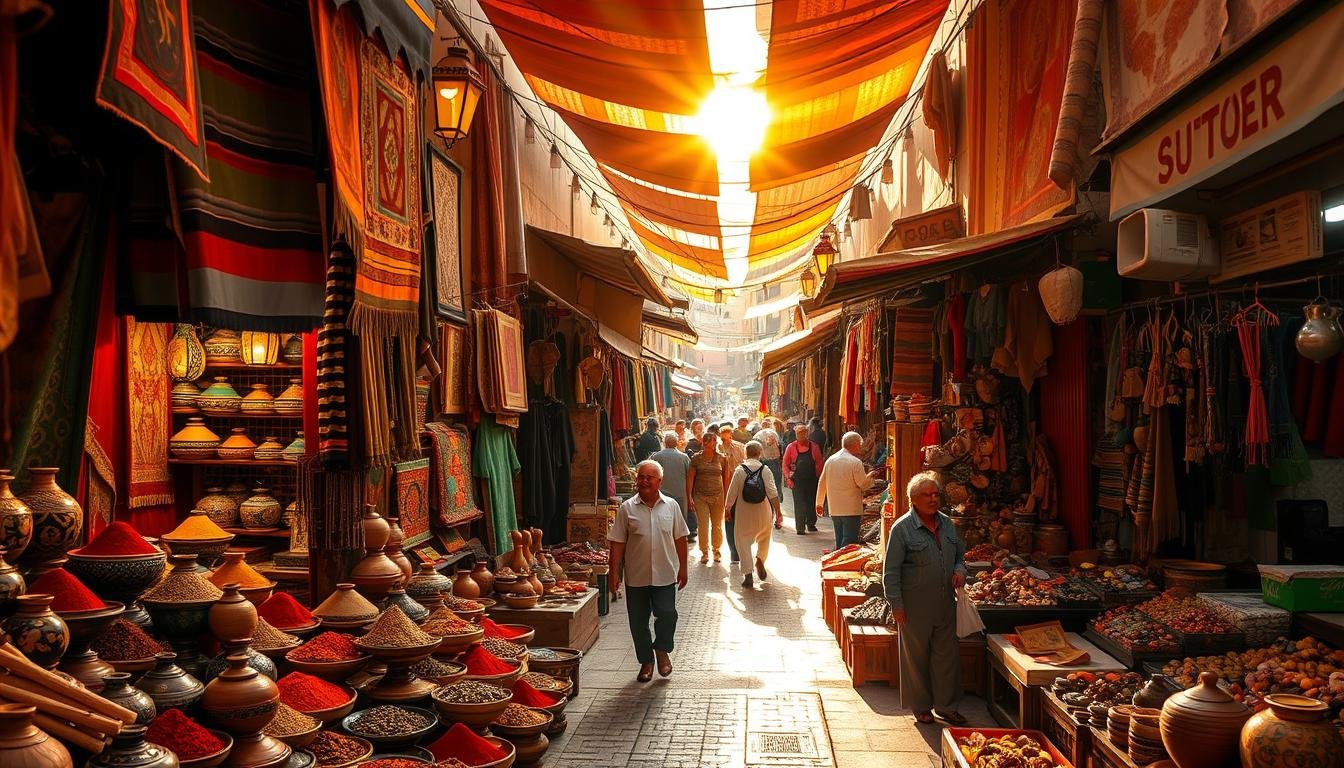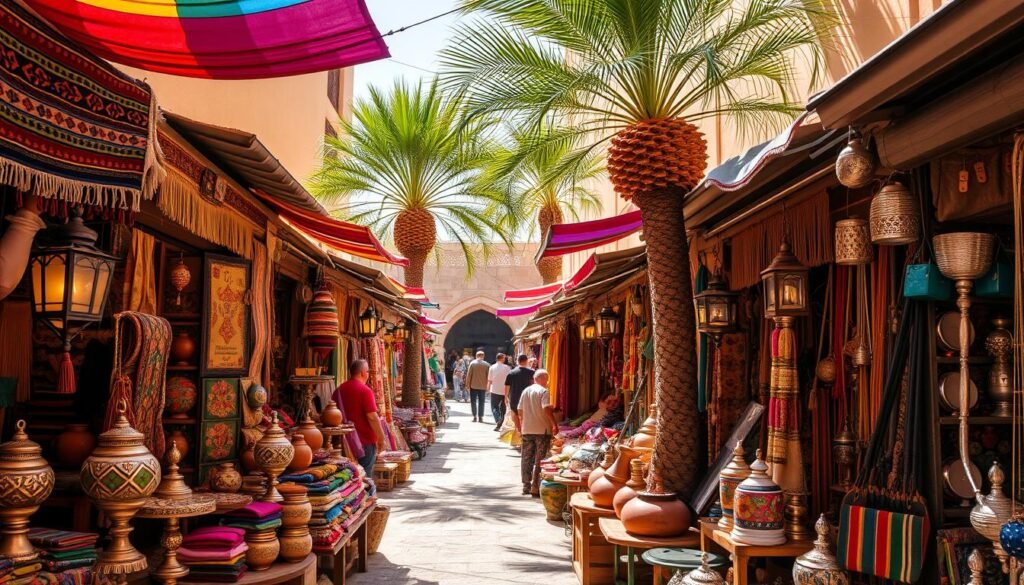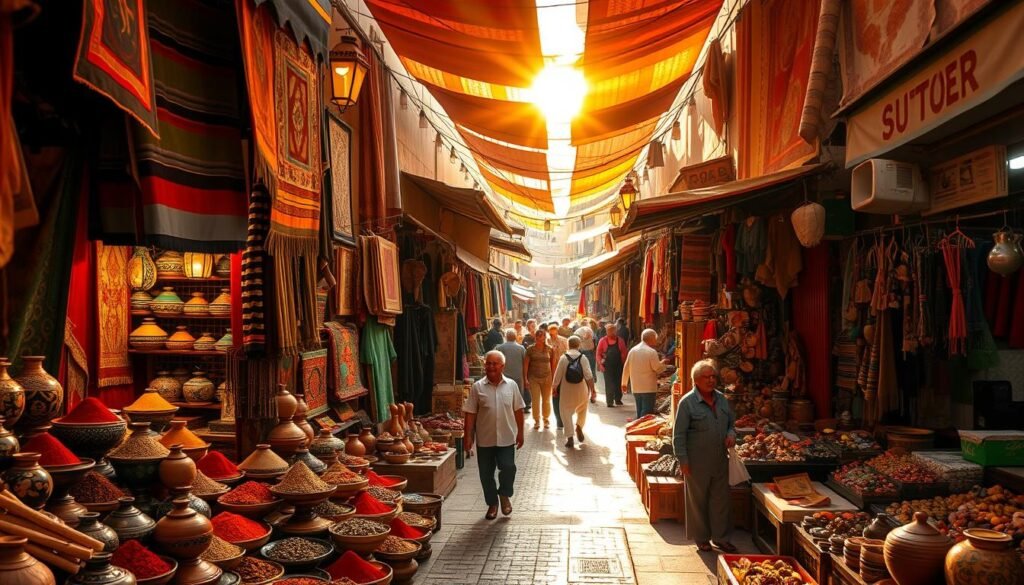Physical Address
304 North Cardinal St.
Dorchester Center, MA 02124
Physical Address
304 North Cardinal St.
Dorchester Center, MA 02124

As you step into Morocco’s vibrant streets, a world of enchantment awaits. The country’s rich culture shines through its local crafts and artisanal products. You’ll find these treasures in the bustling souks across the nation.
Whether you’re drawn to the intricate weavings of Marrakech’s Weavers’ Souk or the captivating spices of the Spice Souk, a journey through these markets is unforgettable. It promises to ignite your senses and reveal the heart of Moroccan creativity.

A vibrant Moroccan marketplace filled with colorful handwoven rugs, intricate pottery, and traditional lanterns. Stalls adorned with beautifully crafted leather bags and silver jewelry, surrounded by lush palm trees and the backdrop of historic architecture. Sunlight filtering through colorful fabric canopies, creating a warm and inviting atmosphere.
Step into the vibrant world of Moroccan souks, where old traditions meet new art. These lively markets, in the heart of cities like Marrakech, take you on a journey through Morocco’s rich culture.
The Marrakech souks are a maze of markets, each with its own special products or crafts. Marrakech’s role as a trading center has drawn merchants from all over. This has made the city’s market scene diverse and lively.
Because of the many traders, the medina was built with many gates. This helped merchants get around easily. As the city grew, more specialized souks popped up near homes. This made the city’s shopping scene even better.
Dive into the amazing world of Marrakech’s top souks. Each one offers a unique shopping and cultural adventure:
Looking for artisan goods, traditional Moroccan textiles, or just the lively vibe of the Marrakesh souks? These markets offer a unique shopping and cultural experience.

A vibrant scene of the Marrakech Souks, showcasing a maze of narrow, winding alleys filled with colorful textiles, handwoven rugs, intricate pottery, and gleaming lanterns. Spice stalls overflowing with aromatic spices in vibrant hues, artisans crafting jewelry and leather goods, and lively street vendors surrounded by curious shoppers. The warm golden light of the sun filtering through awnings, creating a magical atmosphere filled with rich culture and tradition.
Discover the colorful world of Moroccan handicrafts and artisanal products in the souks. You’ll find everything from traditional fashion and footwear to organic skincare and home decor. These items show off Morocco’s rich cultural heritage.
Dive into the colorful world of Moroccan fashion. You’ll see traditional kaftans, djellabas, and scarves that capture Moroccan style. Pair these with handcrafted slippers or babouches, made with old techniques.
Try Moroccan organic skincare products, great for today’s man. Learn about argan oil, ghassoul, black soap, and kohl. These natural items have been used for centuries to care for the skin.
Make your home feel like Morocco with stunning decor items. The souks have beautiful textiles, rugs, ceramics, and more. Find unique zellige tiles and Berber rugs to add Moroccan charm to your home.
“The Moroccan souks are a treasure trove of local crafts and artisanal products that reflect the country’s rich cultural heritage.”
Exploring the Moroccan souks can be thrilling but also overwhelming. To enjoy your shopping trip, remember a few important tips. Start by visiting in the mornings when the souks are less busy. This makes for a more peaceful shopping experience.
When looking at prices, don’t hesitate to negotiate. Knowing the true worth of items helps you get a good deal. Bargain with respect and understand the value of what you’re buying.
Embracing local customs adds to the fun. Accepting mint tea is a sign of welcome. Dress appropriately and ask before taking photos. Most importantly, take your time and enjoy the journey through the souks.
By following these tips and embracing local customs, you’ll find unique treasures. These will remind you of your magical shopping adventure in Morocco.
| Souk Statistic | Comparison |
|---|---|
| Souks in Marrakech are more touristic compared to Fes. | Fes souks have more limited boulevards, making it easier to get lost without a guide. |
| Marrakech souks often have motorbikes riding through the medina. | Souk El Had in Agadir is highlighted as a less chaotic option for shopping. |
| It is common practice to haggle when shopping in Moroccan souks. | Many vendors in Moroccan souks do not accept credit cards, requiring customers to pay in cash. |
| Tourists are advised to plan their shopping trips in advance to make the most out of their visit to Moroccan souks. | The morning shopping suggestion at Souk Semmarine in Marrakech hints at lower visitor numbers earlier in the day. |
Exploring Morocco’s local crafts and shopping is a must. You’ll find vibrant markets, charming medinas, and unique fish markets. These places are filled with traditional moroccan artisan goods and authentic experiences that show off the country’s rich culture.
Shopping in Morocco is unlike anywhere else. You can find leather goods, metalwork, pottery, and lanterns. The country’s skilled artisans and long history of craftsmanship mean you’ll find unique, high-quality items perfect for souvenirs or gifts.
Look for traditional Moroccan textiles like Berber rugs and hand-woven blankets. Also, check out intricate ceramics, vibrant pottery, and beautifully crafted metal lanterns. Bargaining is a big part of the fun in Morocco’s famous souks.
“The souks of Morocco are a treasure trove of artisanal goods, each item a reflection of the country’s rich cultural heritage.”
Whether you’re looking for fashion, home decor, or authentic Moroccan experiences, Morocco has it all. The local crafts and shopping experiences in morocco will amaze you and leave you with wonderful memories.
The bustling souks of Marrakech and the charming medinas of Fez are full of opportunities to dive into Moroccan culture. You’ll find unique, handcrafted treasures. Keep an eye out for these exceptional Moroccan artisanal products:
Whether you’re looking to shop or just enjoy the sights, sounds, and scents of Morocco, you’ll find treasures. These items will remind you of your time in this captivating country forever.
A trip to Morocco isn’t complete without visiting Fez and its famous Souk el Attarine. This city is a maze with over 9,000 alleys. The Souk el Attarine is a center for traditional crafts and goods. Here, you can find fez medina shopping, souk el attarine, and traditional Moroccan spices and herbs. It’s a chance to dive into the city’s rich history and medieval vibe.
Fez is one of the oldest cities in the world, founded in the 9th century. It’s a UNESCO World Heritage Site and has no cars. The Fez Medina is ancient, with narrow alleys, shops, mosques, and beautiful wooden doors.
The Souk el Attarine is a must-see in the Fez Medina. It’s known for its spices, herbs, and incense. You can explore the shops in old mansions and find unique items like leather goods and woodcarvings.
| Fez Highlights | Description |
|---|---|
| Chouara Tannery | The most iconic tannery in Fez, dating back over a thousand years and renowned for its traditional leather-making process. |
| Al Attarine Madrasa | A 14th-century Islamic school known for its beautiful decorations, mosaics, and ornate ceilings. |
| Dar Batha | A museum that houses around 6,000 pieces of traditional Moroccan art, including woodcarving, zellige tilework, and astrolabes. |
Looking for traditional Moroccan spices and herbs, unique souvenirs, or a deep cultural experience? The Fez Medina and Souk el Attarine will impress you.
Step into the vibrant coastal town of Essaouira, where the bustling essaouira fish market offers a captivating shopping experience unlike any other in Morocco. Unlike the crowded souks of Fez and Marrakech, the fish market in Essaouira provides a refreshing and authentic glimpse into the local culture of this charming Moroccan town.
As you wander along the docks, you’ll be greeted by the sight of colorful fishing boats. Both traditional wooden vessels and modern trawlers are docked or bobbing in the water. The market is a serious commercial operation, with workers pulling in the fresh daily catch of an assortment of seafood early each morning.
The seafood meal experience in Essaouira is a true delight. It features fresh crusty bread, olives, chopped salad, and seafood cooked in a variety of spices, served family-style. The restaurant setting is often a basic setup with simple wooden tables and chairs, and paper placemats. This adds to the rustic and authentic charm of the dining experience.
“The essaouira fish market offers a sensory experience with lots of people, cats, the smell of fresh seafood, and fish being cleaned and prepped for sale.”
Exploring the essaouira fish market is a must-do activity for visitors to this Moroccan coastal town. The sights, sounds, and aromas create a truly immersive experience. It allows you to fully immerse yourself in the local culture and purchase the freshest seafood for your culinary adventures.
Bargaining and negotiation are key parts of shopping in Moroccan markets. Vendors usually start with high prices, hoping you’ll haggle for a better deal. To succeed, you need a smart strategy.
Start by looking at prices in different shops. This helps you know what’s fair. When you negotiate, start with half the price they ask. Be ready to go back and forth.
The art of bargaining is a big part of Moroccan culture. Be friendly and respectful. This way, you get good prices and make friends with vendors.
Learn some Moroccan phrases like “kam huwa?” (how much?) and “mumkin tukhaffad?” (can you lower the price?). It shows you care about the culture.
Shopping in groups can help you get better deals. If you can’t agree, thank the vendor and try another stall. Being willing to walk away can lead to better prices.
By diving into bargaining, you’ll find amazing Moroccan items at great prices. You’ll also learn a lot about local shopping customs.
“Bargaining is the Moroccan national sport. It’s a dance, a game, an art form.”
Dive into the world of Moroccan textiles, where old weaving traditions shine. You’ll find colorful kaftans, shawls, and the detailed Berber carpets. These textiles show Morocco’s deep cultural roots.
Berber carpets are top picks for Moroccan souvenirs. They’re made by skilled Berber communities across the country. Each carpet is a unique piece, with designs that tell the region’s story.
Berber carpets are not just beautiful. They carry deep cultural meaning. They share stories, influence design, and connect cultures. This makes them a true symbol of Morocco’s lasting artistry.
“Moroccan rugs, also known as Berber rugs, are significant historically and culturally for Morocco, often carrying symbolic meanings and fostering cross-cultural exchange.”
Exploring traditional Moroccan textiles and Berber rugs reveals fascinating stories. You’ll see the elegance and cultural value of these artworks. Let them take you to the heart of Moroccan craftsmanship.
Moroccan pottery, ceramics, and tilework are known for their unique designs and bright colors. In the souks and medinas, you can find handcrafted tableware and decorative items. These pieces, like intricate tiles, show the skill of Moroccan artisans.
Moroccan ceramics often have glazes in blue, green, and terracotta. Making pottery is a detailed process that needs a lot of skill. Each piece is made and painted by hand, showing the artisan’s hard work and talent.
Moroccan ceramics are famous for their bold patterns and floral designs. They are both beautiful and practical, perfect for daily use or decoration. In Morocco, a potter can make 200 to 500 pieces every day.
The art of tilework, called Zellige, is a colorful part of Moroccan crafts. In Fez, Zellige workshops have many artisans working on tiles. These tiles, with their detailed designs, decorate walls, floors, and buildings across the country.
| Moroccan Craft | Interesting Fact |
|---|---|
| Moroccan Pottery and Ceramics | Glazed ceramics have been popular in Morocco since 814. |
| Moroccan Tilework (Zellige) | Zellige workshops in Morocco may have more than eight artisans working on tiles fired in Fez. |
| Moroccan Drums | In a traditional drum workshop in Fez, around 40 drums are produced per day. Moroccan drums are made with a ceramic body and skins that can be made from cow, camel, or fish leather. |
The leather used for Moroccan drums changes the sound they make. This adds to their cultural value. Exploring Moroccan pottery, ceramics, and tilework is a must for anyone visiting Morocco.
Morocco is known for its unique souvenirs, especially leather goods and metalwork. You’ll find everything from colorful leather poufs to stylish leather clothing. Moroccan artisans have mastered their craft, creating beautiful pieces.
Leather poufs are a favorite among visitors, priced between 150 to 300 Dhs (~$15-$30 USD). They are handcrafted with detailed designs and bright colors. This shows the talent of Moroccan leatherworkers.
Morocco is famous for its leather clothing too. You can find biker jackets, bomber jackets, and more. These items, priced between 1,200 Dhs and 2,500 Dhs (~$120-$250 USD), are both stylish and durable.
Moroccan metalwork is also a hit with visitors. You’ll see decorative lanterns and other unique home goods. The metalworkers of Morocco create pieces that add a Moroccan touch to any home.
Whether you love the colors and designs of Moroccan leather goods or the metalwork, these souvenirs connect you to Morocco’s rich culture.
Exploring Morocco’s souks and medinas is a treat. You’ll find many traditional beauty products. Among these, moroccan argan oil and moroccan rose products stand out.
Argan oil is a key product in Morocco. It comes from the argan tree, found in the southwest. Local Berbers work hard to make it, making it a prized item in skincare and food.
Walking through Morocco’s souks, you’ll see many moroccan argan oil products. Prices range from 150 to 300 Dhs (~$15-$30 USD) per bottle. Each one is of high quality and pure.
Morocco is also famous for its rose products, like rosewater and rose oil. These moroccan rose products are sought-after souvenirs. They offer a deep dive into Morocco’s culture and traditions, perfect for any authentic moroccan experiences and traditional moroccan beauty products collection.
“Argan oil is a true treasure of Morocco, a product that embodies the country’s rich heritage and the enduring skills of its artisanal communities.”
One of the most iconic souvenirs from Morocco are the stunning moroccan lanterns. You can find them in souks and marketplaces all over the country. These lanterns have intricate patterns of tiny holes that glow beautifully when lit.
They come in all sizes and prices. You can find small, simple lamps or larger, more elaborate standing fixtures. Moroccan lanterns showcase the country’s rich artisanal heritage. They are beautiful additions to any traditional moroccan home decor.
Whether you want a delicate tea light holder or a grand chandelier-style piece, Morocco’s markets have it all. You’ll find a dazzling array of moroccan lighting options.
As you browse the bustling souks, admire the skilled craftsmanship and rich cultural heritage of each moroccan lantern. With their captivating glow and timeless appeal, these lighting fixtures are a wonderful way to bring Morocco’s essence into your home.
“Moroccan lanterns are not just lighting fixtures, but works of art that illuminate the soul of a culture.”
Exploring Morocco’s local crafts and shopping is key to any visit. You’ll find vibrant souks in Marrakech and charming medinas in Fez and Essaouira. These places offer a rich mix of traditional handicrafts and artisanal products.
Looking for unique leather goods, Berber rugs, pottery, or organic beauty products? Morocco has it all. You can connect with the country’s artisanal traditions and find one-of-a-kind souvenirs.
The variety of artisanal offerings in Morocco is vast. You’ll find famous Moroccan leather goods and Berber rugs. There’s also vibrant ceramics and intricate jewelry.
Visiting Morocco for local crafts and shopping lets you dive into the country’s rich culture. You support local artisans and help preserve traditional techniques. The shopping experience here is memorable and rewarding.
By exploring Morocco’s local crafts and shopping, you get unique souvenirs and learn about the artistry and cultural significance. From the bustling souks to the serene medinas, Morocco’s traditions and creativity await your discovery. Your journey will be unforgettable.
Marrakech’s main souks include the Weavers’ Souk and Dyers’ Souk. You’ll also find the Spice Souk, Babuchas Souk, Silver Souk, and Ceramic Souk. Each offers a unique shopping experience.
The souks are filled with local crafts and artisanal products. You can find traditional kaftans and djellabas, as well as slippers and scarves. There are also organic skincare products and home decor items like textiles, rugs, and ceramics.
To shop well in the Moroccan souks, visit at the right time and know the prices. Understand the value of items and be respectful during negotiations. Don’t forget to accept the traditional mint tea.
Iconic souvenirs include Berber rugs and carpets, pottery, and ceramics. Leather goods, metalwork, argan oil products, and traditional lanterns are also popular.
Bargaining is key in Moroccan markets. Vendors start high, expecting you to negotiate. Scout shops, offer half the price, and be ready to walk away to negotiate further.
The Fez Medina is a vast maze with over 9,000 alleys. Souk el Attarine is a center for traditional crafts and goods. It offers spices, herbs, incense, and handicrafts in beautiful old mansions.
Essaouira’s highlight is the bustling fish market. Here, you can buy the freshest fish and experience the local culture of this charming town.